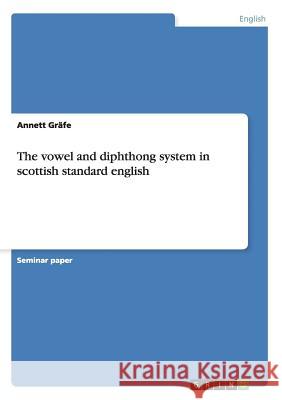The vowel and diphthong system in scottish standard english » książka
The vowel and diphthong system in scottish standard english
ISBN-13: 9783640568598 / Angielski / Miękka / 2010 / 24 str.
Seminar paper from the year 2007 in the subject English Language and Literature Studies - Linguistics, grade: 1,3, http: //www.uni-jena.de/ (Institut fur Anglistik/Amerikanistik), course: Local and Global Varieties of English, 15 entries in the bibliography, language: English, abstract: The paper analyzes the Scottish Standard English vowel and diphthong system and especially the application of Aitken's law and vowel lengthening before postvocalic /r/. The paper includes a brief history of the development of SSE, a detailed discussion of the SSE vowel and diphthong system, the analysis of speakers of SSE (using words from Well's lexical set), and a discussion of vowel lengthening in SSE. Scotland is a region where language experienced many changes in the historical development. A standard form of English has only been spoken there for roughly three centuries. Before English was established Celtic languages such as Gaelic and Old Norse were spoken in most of today's Scotland. From the 14th century onwards a form of English deriving from a northern English accent was established in Scotland. This form was called Scots. Gaelic and Scots both survived until today. Especially Scots had a big influence on what today is called Scottish Standard English. Due to all the different historical developments and influences and a strong national consciousness and awareness the Scottish form of Standard English, which is "pronounced with a Scottish accent and retained a few scotticisms in vocabulary" (Wells 1995: 394), has attained a status quite unique amongst the English varieties. The special phonological system contributes largely to this uniqueness. In SSE one can find phonetic realizations found nowhere else in other accents of English. One such phenomenon is the variation of vowel duration according to the phonetic environment. The rule describing this special feature of Scottish speech is called Aitken's Law or the Scottish Vowel Length Rule. This rule was depicted (cf. Trud











